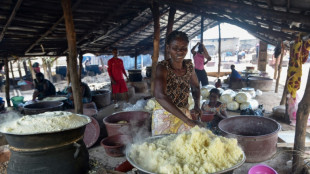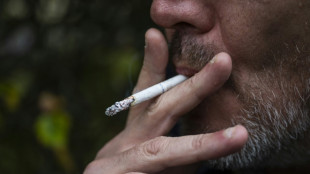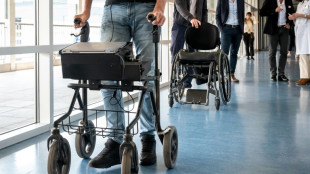
-
 South Korea president clings to power after martial law U-turn
South Korea president clings to power after martial law U-turn
-
Presidential vote seen as referendum on Romania's European future

-
 Hamilton bids farewell to Mercedes as Ferrari vie for title
Hamilton bids farewell to Mercedes as Ferrari vie for title
-
New Zealand unchanged in bid to hit back against England

-
 Macron seeks remedy to France's political crisis
Macron seeks remedy to France's political crisis
-
New Natalia Lafourcade album celebrates music's onstage evolutions

-
 Taiwan's Lai kicks off visit to US territory Guam
Taiwan's Lai kicks off visit to US territory Guam
-
Ivory Coast staple cassava meal gains UNESCO heritage status

-
 OpenAI to partner with military defense tech company
OpenAI to partner with military defense tech company
-
Liverpool held but Slot salutes 'special' Salah

-
 Man City needed to break losing 'routine', says Guardiola
Man City needed to break losing 'routine', says Guardiola
-
Leipzig down Frankfurt to reach German Cup quarters, Cologne strike late

-
 Mbappe admits penalty miss 'big mistake' as Bilbao beat Real Madrid
Mbappe admits penalty miss 'big mistake' as Bilbao beat Real Madrid
-
'Sad, disappointed' Mbappe pays penalty as Bilbao beat Real Madrid

-
 US stocks surge to records, shrugging off upheaval in South Korea, France
US stocks surge to records, shrugging off upheaval in South Korea, France
-
Liverpool held in Newcastle thriller, Arsenal inflict Amorim's first defeat

-
 Shiffrin confirms she'll miss Beaver Creek World Cup races
Shiffrin confirms she'll miss Beaver Creek World Cup races
-
Corner kings Arsenal beat Man Utd to close gap on Liverpool

-
 Mbappe pays penalty as Bilbao beat Real Madrid
Mbappe pays penalty as Bilbao beat Real Madrid
-
NFL Jaguars place Lawrence on injured reserve with concussion

-
 North Korea, Russia defence treaty comes into force
North Korea, Russia defence treaty comes into force
-
Openda hits brace as Leipzig beat Frankfurt in German Cup last 16

-
 Schar punishes Kelleher blunder as Newcastle hold Liverpool in thriller
Schar punishes Kelleher blunder as Newcastle hold Liverpool in thriller
-
De Bruyne masterclass helps Man City end seven-game winless streak

-
 Syrian rebels surround Hama 'from three sides', monitor says
Syrian rebels surround Hama 'from three sides', monitor says
-
Lawyers seek leniency for France rape trial defendants, blaming 'wolf' husband

-
 OpenAI chief 'believes' Musk will not abuse government power
OpenAI chief 'believes' Musk will not abuse government power
-
Thousands rally in Georgia after police raid opposition offices

-
 S. Korea opposition push to impeach president
S. Korea opposition push to impeach president
-
Powell 'not concerned' US Fed would lose independence under Trump

-
 French government falls in historic no-confidence vote
French government falls in historic no-confidence vote
-
Syrian White Helmets chief 'dreams' of never pulling a body out of rubble again

-
 NBA Suns lose Durant for at least a week with ankle injury
NBA Suns lose Durant for at least a week with ankle injury
-
Warhammer maker Games Workshop enters London's top stocks index

-
 Iran Nobel winner released for three weeks, 'unconditional' freedom urged
Iran Nobel winner released for three weeks, 'unconditional' freedom urged
-
Red Cross marks record numbers of humanitarians killed in 2024

-
 Johnson's Grand Slam 'no threat', says World Athletics boss Coe
Johnson's Grand Slam 'no threat', says World Athletics boss Coe
-
Qatar's emir and UK's Starmer talk trade as state visit ends

-
 Cuba suffers third nationwide blackout in two months
Cuba suffers third nationwide blackout in two months
-
Russia, Ukraine to send top diplomats to OSCE summit in Malta

-
 Spanish royals to attend memorial service for flood victims
Spanish royals to attend memorial service for flood victims
-
LPGA, USGA new policy requires female at birth or pre-puberty change

-
 Stick to current climate change laws, US tells top UN court
Stick to current climate change laws, US tells top UN court
-
British Museum chief says Marbles deal with Greece 'some distance' away

-
 Pope Francis receives electric popemobile from Mercedes
Pope Francis receives electric popemobile from Mercedes
-
Gaza civil defence: thousands flee Israeli strikes, evacuation calls

-
 Trump names billionaire private astronaut as next NASA chief
Trump names billionaire private astronaut as next NASA chief
-
Pidcock to leave INEOS Grenadiers at end of season

-
 Seoul stocks weaken, Paris advances despite political turmoil
Seoul stocks weaken, Paris advances despite political turmoil
-
South America summit hopes to seal 'historic' trade deal with EU


Malaria: Killer of African children set for vaccine zap
Hundreds of thousands of people, mostly children living in Africa, succumb every year to malaria, an age-old mosquito-borne scourge that worsened during the Covid-19 pandemic.
The World Health Organization (WHO) estimates that 627,000 people died of malaria in 2020, the latest year for which figures are available -- an increase of 12 per cent over 2019.
Ahead of World Malaria Day on Monday, AFP takes a look at this notorious disease and the excitement surrounding new vaccines.
- Half the world at risk -
Malaria is a threat to half the world's population.
Sub-Saharan Africa, Southeast Asia, the eastern Mediterranean, the Americas and areas in the Pacific such as Papua New Guinea and the Solomon Islands are all considered at risk.
- Rolling back disease -
Before 2020, the world had made steady progress on the transmission and treatment of malaria, chiefly through the use of insecticide-treated mosquito nets, testing and effective drugs.
Annual cases had fallen by 27 percent by 2017 compared with the start of the century and deaths had plunged by over 50 percent.
In June 2021, China was certified as malaria-free by the WHO, ending a long battle that began in the 1940s when the country reported 30 million cases annually.
China has gone four consecutive years without a single locally-sourced case.
- Setback -
Some 241 million cases of malaria disease were recorded worldwide in 2020, 14 million more than a year earlier, according to the WHO.
Approximately two-thirds of the additional deaths in 2020 were linked to disruption in providing malaria prevention, testing and treatment during the coronavirus pandemic.
Many patients avoided hospitals for fearing of contracting the novel virus.
- Big killer in Africa -
Sub-Saharan Africa is where 95 percent of all malaria cases and 96 percent of all deaths occur.
Half the world's cases in 2020 were reported from four African countries: Nigeria (31.9 percent of known cases), DR Congo (13.2 percent), Tanzania (4.1 percent) and Mozambique (3.8 percent).
- Very young victims -
Children under five are the most vulnerable to malaria.
In 2020, some 80 percent of the total malaria deaths on the African continent were in this age category.
- Five parasite species -
Records of the disease date back to antiquity, with symptoms including fever, headaches and muscle pain, followed by cycles of chills, fever and sweating.
Five parasite species cause malaria in humans, and all are spread through the bites of infected female mosquitoes.
The Plasmodium falciparum parasite is responsible for the most deaths.
- Treatments -
Several preventative treatments are available that help reduce the intensity of the disease and avoid deaths as well as reduce transmission.
The WHO says the best, particularly for P. falciparum malaria, is artemisinin-based combination therapy (ACT).
Preventative treatments are also strongly recommended for pregnant women and infants living in at-risk areas and travellers going to these zones. Insecticide-treated bed nets are also a cheap and effective shield.
- Vaccine buzz -
In October 2021, the WHO recommended "broad use" of the world's first malaria vaccine for children in sub-Saharan Africa after reviewing a pilot programme run in Ghana, Kenya and Malawi.
The RTS,S vaccine, which is made by the British pharmaceutical giant GlaxoSmithKline, was found to considerably reduce child mortality from the P. falciparum parasite, which is most common in Africa.
Other vaccines are on the horizon, including one developed by Britain's Oxford University, whose Matrix-M vaccine candidate became the first to surpass a WHO threshold of 75-percent efficacy.
O.Krause--BTB




